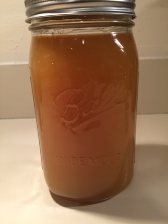Fire Cider
Fire Cider has a long history as a traditional folk remedy cure for digestive complaints, circulatory problems, and as a preventative for winter time colds and flu's. It isn't too late to make this home remedy to use for yourself and or your loved ones this winter. Of course you can also buy it at a local health food store. The ingredients vary for the making of fire cider, but here is what I included in my first homemade batch and why.
 |
The Ingredients (all organic)
1/2 cup of chopped Horseradish
1/2 cup of chopped Ginger
1 garlic bulb (about 10 cloves) peeled and chopped
Juice of one quartered lemon, along with skin
Juice of one quartered orange, along with skin
1 tablespoon of turmeric powder
1/2 teaspoon of black pepper powder (or peppercorns)
1 tablespoon of dried rosemary leaves
1/2 teaspoon of crushed red pepper flakes
Organic apple cider vinegar
Organic raw honey
|
Directions
Place all the above ingredients into a glass jar and cover with the organic apple cider vinegar. You need to shake it daily and if the glass jar has a metal top you will want to use wax paper as a barrier to the lid so that the apple cider vinegar doesn't contact the metal lid.
After steeping for 4 weeks, strain out liquid and store the liquid in another glass jar. Discard what you strained out. When this process is complete, add in the raw honey that you want, about a 1/4 cup. Dose is about a teaspoon each day.
The Magic Elixer
Horseradish: Is a root vegetable that has been used for centuries as a medicinal as well as a food. It contains significant amounts of Glucosinolates, a phytochemical that has in some studies been shown to have cancer fighting effects. Cruciferous vegetables such as brussel sprouts and broccoli also contain this compound but horseradish contains 10x the amount than those vegetables do. It also acts as a powerful antioxidant, a liver protectant, and a natural antibiotic.
Ginger: Is among the most powerful spices on earth, it also has a long history of use as a medicinal. It's main bioactive compound is gingerol. It can help with nausea, indigestion, inflammation of joints, can lower blood glucose, and help lower other heart risk markers such as cholesterol, hemoglobin A1c and ApoB. Gingerol can also fight infections and has been effective at helping with menstrual pain. Another substance in ginger called 6 gingerol has shown promise at reducing cancer risk.
Garlic: A plant from the onion family garlic also has a long history not just as a spice but also as a medicinal. High in a sulfur compound Allicin, garlic has been used for thousands of years as a natural antibiotic. In many cultures garlic was given to increase the strength and work capacity for laborers.
Lemon: In 1747 James Lind found that lemons and oranges were effective at treating scurvy, which is a disease many seafarers suffered with from a lack of vitamin C. Vitamin C, is an extremely important antioxidant which aids the immune system. Lemons are high in mineral electrolytes, and has been used for many health problems such as digestive help, inflammation and high uric acid levels.
Orange: Like lemons, oranges are a good source of vitamin C and electrolytes. Oranges are also high in folate, and other B vitamins. It has 170 different phytochemicals and more than 60 flavonoids. It contains choline (good for the nervous system), zeaxthanine, and carotenoids (antioxidants).
Turmeric: If you type Turmeric into Pubmed you will get over 3000 articles written for the use of this amazing spice. It’s main component curcumin has been used as an anti-inflammatory and can block NF Kappa B, an inflammatory chemical, and it increases a hormone BDNF (brain derived neurotrophic factor) in the brain. It is believed that this may help with dementia and Alzheimer’s disease. Black Pepper, contains piperine which is showing to improve the absorption of curcumin by 2000%.
Rosemary Leaf: An herb with compounds such as rosmarinic acid, works as an antimicrobial and as an antioxidant. Its oils have been used to help memory, and mood.
Red Pepper Flakes: Spices such as crushed red pepper aids with allergies, inflammation, and reduces risk of blood clots and strokes. It also boosts immunity. The hot peppers are full of antioxidants, flavonoids and B vitamins such as niacin.
Apple Cider Vinegar: High in acetic acid this acts as a potent antimicrobial. The organic variety has friendly bacteria and can help with joint inflammation, high blood sugar, and energy levels.
Raw Honey: Has antibacterial, antiviral, and antifungal properties. It is naturally soothing to the digestive tract. Ancient Greeks called it “the nectar of the Gods”.
Summary: I could have devoted an entire newsletter for each of these ingredients. This represents an all-star lineup of nature’s finest remedies to keep us healthy! Give it a try! Caution, if you have an ulcer or a sensitivity to any of the ingredients listed, this might not be the remedy for you.